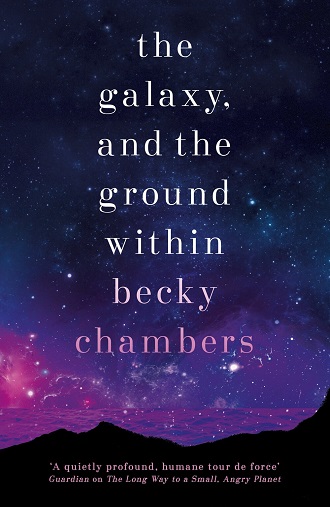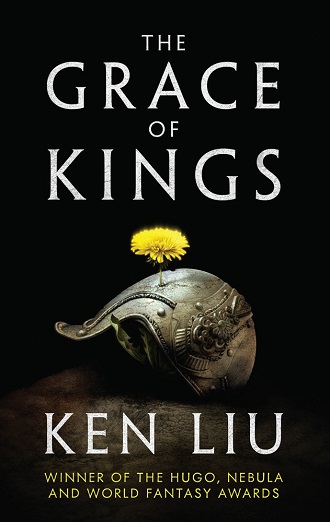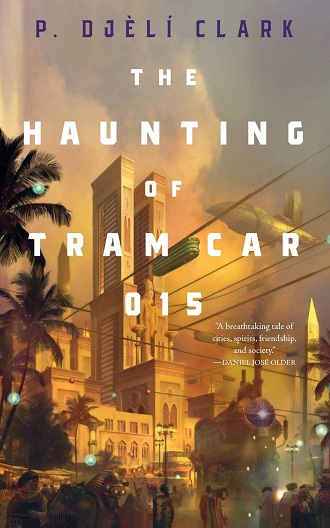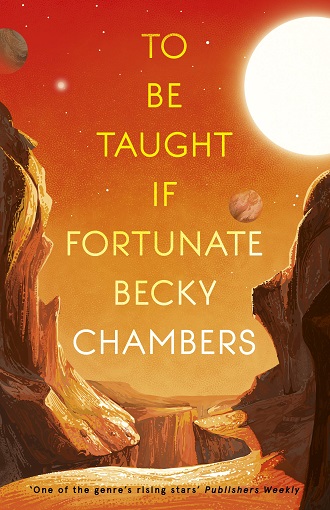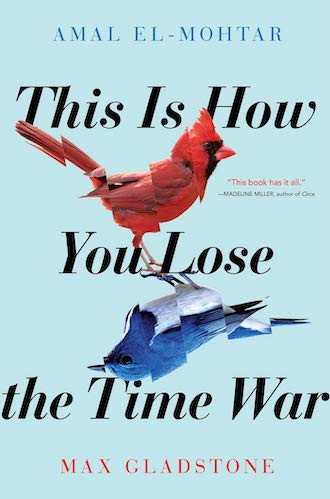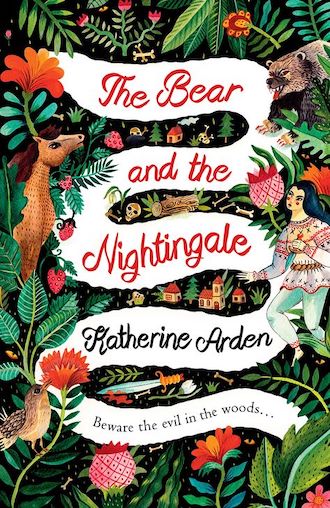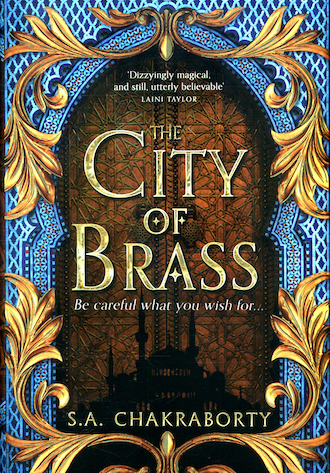The annual r/fantasy bingo challenge is a staple of the community and the latest one finished on March 31st. I managed to complete it this year thanks to many of the squares lending themselves to the books on my pre-existing TBR.
Since I have written reviews for very few of my bingo books, I thought I’d write a quick 2-3 line micro-review of each, roughly in order of ratings (emphasis on roughly)
The Steel Seraglio – Mike Carey, Linda Carey, and Louise Carey (Non-Western Setting)
Okay I actually did write a review for this one. You can read it here, but the gist is that this book is perfect. And at only 646 Goodreads ratings, it’s criminally underrated. Written in the style of folktales, it’s a poetic and optimistic telling of a group of 100 concubines exiled and forced to adapt to life in the desert. My absolute favourite book of the year and easily an all-time contender.
The Traitor Baru Cormorant – Seth Dickinson (2017 Top Books)
Most people will have heard of Traitor Baru by this point, the story of a gifted young women who plots to tear down an oppressive empire from the inside. It’s got everything that you want in book – anti-colonialism themes? F/F relationships? Copious accounting? What else do you need?
The Handmaid’s Tale – Margaret Atwood (Novel Adapted)
You know how sometimes classics really let you down because everyone talks so highly of them (looking at you Gunslinger)? The Handmaid’s Tale is the complete opposite of that. While it seems incomprehensible that the real world could suddenly become what Atwood describes, the subtle little changes that finally result in such a dystopia are all too easy to imagine, making this as powerful as it surely was 30 years ago.
The Fifth Season – N K Jemisin (LGBT Characters)
I’m glad I started with a fairly unknown book because wow these last few are making me look so basic. Anyway, Fifth Season. You know the deal. Three books, three Hugos. Scathing indictment of racism and otherism. Partially written in the second person. Legitimate reasons for multiple POVs (rather than a crutch for showing more of the world). Nonchalant poly relationships. Two glossaries. Okay that last one wasn’t as important but for real, go read the book and come back to read the rest of this post.
The Winged Histories – Sofia Samatar (< 2500 GR Ratings)
Okay good back to unknown books, look I have such sophisticated tastes. The Winged Histories is such an excellent book, not just because of all the political manoeuvrings that go on in the background, or the themes of independence, religion, and rebelling against or accepting predetermined lives, but because of the prose. It’s mind blowing well written. It’s lyrical, it’s densely packed with information for just 300 pages, and Samatar casually switches between the present day and political, historical and cultural asides when necessary. This sounds like a hassle, but it works seamlessly. I could go on and on but just know it’s beautiful and so much more than simply a civil war.
Record of a Spaceborn Few – Becky Chambers (Space Opera)
Remember when I said these would be 2-3 lines each? Okay let’s be more concise. This one’s easy anyway. If you’ve liked any Wayfarers books, you’ll like this no doubt. With Chambers’ trademark sanguinity it’s another perfect instalment in the series.
The Golem and the Jinni – Helene Wecker (Historical Fantasy)
A great slice of life novel following the titular beings in 1900 New York. Everyone talks about the exploration of friendships and religion and self-purpose which are excellent but the stand out feature is the plotting. The two main POVs along with a few side ones sublimely snowball into a tense climax. Whenever you feel underwhelmed by a book’s pacing but can’t verbalise how it should be, this is the answer. Worst part is Wecker using the vastly inferior spelling of djinn.
Lud-in-the-Mist – Hope Mirrlees (Features the Fae)
Described by Gaiman as ‘the single most beautiful and unjustifiably forgotten novel of the 20th century’ and I can’t put it any more succinctly or accurately than that. Benefits from the novel factor of being pre-influential fantasy books/dnd and thus entirely unique in its depiction of the fae. Also it’s quaint af. I can’t overstate just how adorably quaint everyone is.
The Tower of Living and Dying – Anna Smith Spark (Featuring a God as a Character)
Spark has this magnificent way of describing everything so intensely, almost aggressively. Not just the visceral fights but even scenes that would be banal or filler by another author, like descriptions of food or buildings are so detailed it’s almost uncomfortable. It’s hard to explain but it’s utterly unique and while it’s certainly not for everyone, it’s brilliantly unique. Also, it’s a brave decision and certainly not easy to make every character unlikeable and still be captivating but Spark pulls it off with aplomb.
The Lions of Al-Rassan – Guy Gavriel Kay (Protagonist is an Writer)
My first GGK and certainly not my last. I was hesitant going in, wondering how GGK would be able to create a convincing epic historical fantasy and resolve it satisfactorily within one book but he absolutely accomplished it. A clear analogue of Spain/Morocco relations with some Jewish-esque persecution thrown in for good measure, the book could easily have become a mess of political and religious strategies but instead it’s a fascinating and complicated study of love, bigotry, and war.
The City & The City – China Mieville (Standalone)
What if there were two identical cities split not by a Berlin Wall divide but instead geographically overlapped with the citizens resolutely ignoring the those from the other city? That’s the premise of the book and was more than enough to attract my attention. Fortunately, so, as the main plot advancement of a detective trying to solve a murder that involves both cities was interesting but not quite as novel. Regardless, Mieville’s limitless imagination and nuance is on show once more – I can’t imagine anyone else pull off such an ambitious and culturally heavy topic.
The Paper Menagerie and Other Stories – Ken Liu (Anthology)
Anthologies are a tricky breed to evaluate but this was easily worth the price of admission just for The Paper Menagerie. Better to go in blind, just know it’s a touching wee story. A lot of the stories will resonate more with 1st/2nd generation immigrants and many focus on the clash of Eastern and Western cultures but even if those themes are not directly relevant to your own life the number of award noms and wins (spoiler, it’s a whole bunch) will surely pique your interest.
City of Lies – Sam Hawke (Reviewed on r/fantasy)
Either I’m blissfully unaware of the genre or there is a distinct lack of whodunnit fantasy novels. Fortunately, Hawke comes blasting in with a debut that remedies this with a stellar group of main characters that are dangerously likeable considering how constantly they are at risk of being poisoned. Seriously, if you’re into intrigue and poison, this book is perfect.
The Djinn Falls in Love and Other Stories – Mahvesh Murad and Jared Shurin (RRAWR Book)
From a blockbuster list of authors (Neil Gaiman, Maria Dahvana Headley, Nnedi Okorafor, Sami Shah and Helene Wecker among many more) comes an eclectic spread of interpretations of djinn behaviours and cultures. The diversity will ultimately mean it’s unlikely you’ll love them all, but every story is a fresh and unique take on the now somewhat overused mythology of djinns. Bonus marks for the exemplary spelling.
The Prince of Cats – Daniel E Olesen (Takes Place in One City)
Imagine an Assassin’s Creed style plot (without the weird Apple of Eden stuff) but with a lone wolf version of Locke Lamora as the MC. That’s the Prince of Cats in a nutshell but glosses over how cleanly written it all is. Olesen isn’t afraid to slam the brakes on the fast-paced plot to hit Jawad (the MC) with some serious development but then doesn’t get bogged down in his head. Every aspect is so historically and culturally accurate it could easily pass as historical fiction. Despite having only one perspective, side characters are fleshed out enough to steal scenes – everything comes together to make an excellent novel.
Princess Princess Ever After – Kate O’Neill (Graphic Novel)
I’m not much of a comic reader or audiobook listener so was kind of dreading this square. Fortunately, a friend linked to this cute webcomic. ‘Cute’ being the definite word. It is so adorable. Between there being random petals fluttering in the background every time the princesses touch to them stopping an ogre destroying a town by teaching him to dance, everything about this comic is wholesome.
Arm of the Sphinx – Josiah Bancroft (Features a Library)
Did you guys know that the Books of Babel is a good series? I know right, but bear with me. Arm of the Sphinx is a great sequel to an already very great debut – getting access to the viewpoints of the supporting cast was a pleasant surprise and only emphasised my correct theory that Voleta is the best character. I did feel that the book slowed down compared to the first as a result of having more character POVs, but the world is so weird and interesting that it was hardly a bother.
Circe – Madeline Miller (Goodreads Book of the Month)
Circe is tough one to sum up. On one hand, it’s written wonderfully and perfectly grasps the wonder of the Greek gods. The descriptions and sardonic remarks by Circe simultaneously draw you into the scope of the myths while keeping you grounded to the very real (well, ‘real’) implications of them. And of course, it gives a voice to Circe moving her past the depiction of a jealous, vapid, psycho woman who turns nice men into pigs. But the feminism representation that it boasts rings hollow when it takes these one-dimensional portrayals and just passes them onto every other female character (Scylla, Athena, Pasiphaë, and basically every nymph ). It’s still an excellent retelling of Greek myths and an excellent in its own right but I feel that there’s better bastions of female empowerment out there.
Assassin’s Apprentice – Robin Hobb (Under Author Pseudonym)
Hobb’s gigantic saga starts here and it’s a very different start than one might expect. There aren’t any big action scenes hook in the reader or a bunch of POVs to reveal the world. It’s a very introspective, character-driven book. Definitely a love-or-hate type depending on your preferences but it’s exactly what I like. I did feel it went on a bit long though and while I really want to keep reading the series, I have yet to build up the strength to read of Fitz ‘my-life-is-a-literal-nightmare’ Farseer suffer for two ~700-page novels.
Borne – Jeff VanderMeer (One Word Title)
Borne is a weird af book. That’s not an insult mind you, being weird is VanderMeer’s forte and Borne is no exception. In this biopunk world, one thing I really liked was VanderMeer’s use of nature in uniquely interesting ways such as memory fish, firefly-based lighting, and attack beetles. If none of that makes sense, don’t worry. You don’t go into a book like this to understand the science fiction being used. Just embrace the strangeness and dive in.
Traitor – Krista D Ball (Self Published)
A quick read but by no means an easy one, Traitor follows a self-loathing, heavily depressed individual eking out a life in indentured servitude. If that doesn’t sound fun, I don’t know what does. Despite the heavy topics dealt with, through injecting just enough humour and keeping the plot moving swiftly, the book never gets too despondent. I do feel that there was a little too much emphasis on just how terrible the villain was. It probably would have been fine in a longer book but spending so many precious pages repeatedly showing that he is a creep was a bit disproportionate (but to be clear, he really was an ultra creep).
The Whitefire Crossing – Courtney Schafer (Features a Mountain)
Look, people need to stop using the trope of ‘oh I have a massive secret, but I won’t tell this person I’m entrusting my life to because they might react poorly’. There were some really interesting concepts used in this book (I liked how despite magic being locked to minority of people, most can buy magical artefacts for a variety of purposes and I’m pretty sure all the mountain climbing was accurate to real life) and I was pleasantly surprised by the story going further than one might expect. But this single trope annoyed me for about three quarters of the book until it was resolved.
The Black Company – Glen Cook (Published Before You Were Born)
I was looking forward to reading The Black Company – it’s a short read, is a model military fantasy along with being one of the precursors to the grimdark genre. But I was underwhelmed by the first book. Little things like characters using Americanisms such as ‘pants’ and ‘cussing’ kept pulling me out of the world. Not to mention, there’s one token non-white guy and I swear every time he’s mentioned; the MC has to describe him as a ‘little black man’. Is there a name for the phenomenon where if a person has a dark skin colour, then it’s referenced at every occasion? If there is, The Black Company fails that test repeatedly. The rest of the books are probably pretty great, and I’ll get around to them eventually, but I don’t feel any great rush.
The Wolf – Leo Carew (Published in 2018)
This ambitious alt history of Great Britain intrigued me with its premise of having two species of humans living on the island. But I was disappointed when it turned out to be just a very by-the-numbers fantasy. There’s the hero who reluctantly becomes king, those in his inner circle conspiring against him because why not, the single woman who of course is excessively snarky and then gets semi-fridged, the old mentor, secret police/assassins that keep threatening the hero but never actually do anything and the evil neighbouring kingdom. Every so often there’s a glimpse of something interesting and I wish Carew focused more on the biological differences between the human species (which I’ve never seen before) but ultimately, with so many stellar debuts coming out every year, it’s just not worth reading one that is exactly okay.
Theft of Swords – Michael J Sullivan (Hopeful Spec-Fic)
The most diplomatic way for me to review this is to say it wasn’t for me. Stop reading there if you’re a fan or your name rhymes with Cycle K Mulligan, I’m going to lay into it. But to be specific, the dialogue is clunky (“No, I won’t order you to marry my daughter, I treasure her” who talks like that?), the reader is repeatedly bashed over the head with exposition, in one page elves are transparently used as an allegory for racism and then the next chapter one of the MCs quips how much he hates all dwarves and it’s played for laughs. People say the book is an example of how to embrace tropes properly. They’re half right: literally every trope under the sun (except dragons, but who knows, there’s a million books in the extended setting) are thrown in. If The Wolf follows a checklist of tropes, Theft of Swords photocopied the list and put a cover on it. I would equate it to fanfiction but considering AO3 was just nominated for a Hugo, it would be an unfair comparison.
I think, as a whole, the challenge was a success. I delved into genres that I would usually ignore and some of the more specific prompts convinced me to finally get to some books that I’d been meaning to for a while. I was pretty pleased with all the books I read for. Even those that I didn’t enjoy too much, I’m still glad I read. I think I’ve found that I’m just not that into epic traditional fantasy anymore (or at least for the moment). I definitely seem to be giving higher ratings to smaller scale, character-focused books.
One issue I have is the ‘one author per card’ rule. Of course, it makes sense to be included as the point is not stick with just one author and fill up the card with all their books. However, it has the unintended side effect of discouraging sequel. The Fifth Season was one of my favourite books read over last year and I couldn’t wait to read the next two. But since I don’t read a huge number of books a year, 25 is quite a significant portion of that and I wanted to focus on finishing the card. So ultimately, I chose to fill out squares rather than finish multiple series. This was also the case with The Traitor Baru Cormorant and The Black Company, though to a lesser extent. As a result, you might notice that a vast majority of the books were standalone – partially because I like standalones more, but also so that I didn’t give myself too many unfinished series.

